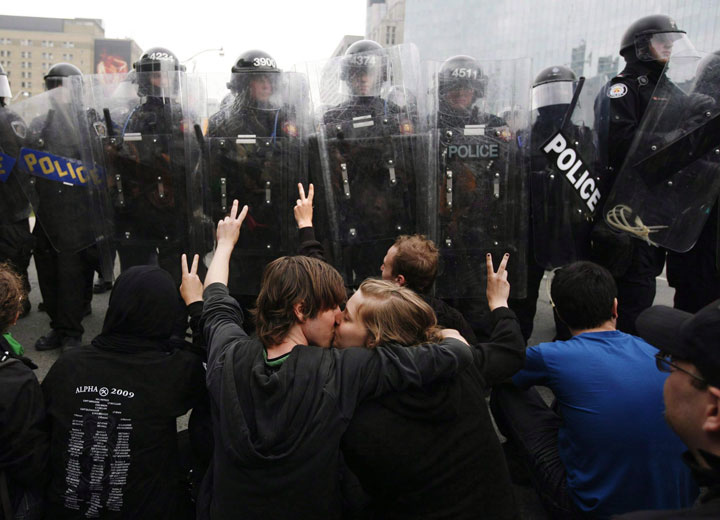TORONTO – Ontario’s top court will hear arguments on Monday about whether two lawsuits arising out of the mass detentions during the tumultuous G20 summit in 2010 should go ahead as class actions.

Police authorities in Toronto want the Court of Appeal to quash the proceedings, which have already been subject to two lower court rulings. The courts had originally ruled against certifying a class action, but Divisional Court overturned the ruling on initial appeal and instead split the action in two.
In its factum, the police services board argues Divisional Court overstepped its boundaries in expressing concern that the mass arrests could be seen as “one of the hallmarks of a police state” and therefore needed a thorough airing as class actions.
READ MORE: 4 years after Toronto G20, Ontario replaces secret law
The board argues the original judge was correct in deciding the different behaviour of various summit protesters precluded their being considered a class.
“The Divisional Court translated its expressed concern about overbroad arrests into a common-issues hearing, which does not allow consideration of the individual conduct of those alleging false arrest,” the board states in its factum.
“Conduct varied such that determining whether grounds existed in respect of one of the class member’s arrests could not determine the answer for all.”
The G20 summit over a weekend in June 2010 — marred by vandalism from several dozen protesters — saw more than 1,000 people arrested or detained in what was later described as one of the worst violations of civil liberties in Canadian history. Many were kept in appalling conditions at a makeshift detention centre. Almost all were released without charge within 24 hours.
Sherry Good, now lead plaintiff in one of the actions, was among scores of people police “kettled” in the torrential rain at a downtown intersection. Divisional Court also ruled that Thomas Taylor should represent those sent to the east-end detention centre.
Both want damages for false arrest or imprisonment, and violations of their constitutional rights. They maintain a senior officer gave orders for the indiscriminate roundup of anyone present at various downtown locations — enough to warrant class certification.
READ MORE: Toronto cop found guilty of 3 of 5 charges in G20 mass arrests
“Arrestees included peaceful protesters, bystanders, journalists, legal observers, and Torontonians who were present simply by chance,” their factum states.
“Without the possibility of a class action in this situation, police can arrest entire crowds and only risk a few lawsuits from a few determined and well-resourced people.”
Lawyer Eric Gillespie, who represents Good, said the idea that the individual conduct of each class member needs to be examined is misguided and counter to well-established precedent.
“There are so many examples of class actions that are radically dissimilar on their facts but have been certified,” Gillespie said. “We say this is about as cut and dried as you will ever get.”
Co-counsel Murray Klippenstein said the encircling and arrest of large groups of legitimate protesters is illegal, and they should be allowed to sue as a group.
Arguing, as the police are doing, that people are free to sue individually makes little sense and is “just not feasible,” Klippenstein said.
“It wouldn’t help justice or the protection of Canadian freedoms.”
The Canadian Civil Liberties Association, which is intervening in the appeal, also argues class actions are appropriate.
In green-lighting the two actions, the Divisional Court stressed the broader issue at stake.
“It is important to remember that the police cannot sweep up scores of people just in the hope that one of the persons captured is a person who they believe is engaged in criminal activity,” the court said in its ruling.
WATCH: Full coverage of G20 riots.



Comments